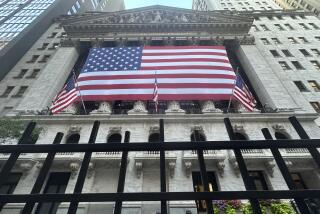Wall Street wavers after congressional testimony from Powell

- Share via
NEW YORK — Stock indexes on Wall Street closed mixed Tuesday after remarks by Federal Reserve Chair Jerome H. Powell in front of Congress did little to change the market’s expectations for the timing of a Fed interest rate cut.
The Standard & Poor’s 500 and Nasdaq composite each rose 0.1%, enough to bump up the indexes to all-time highs for the second time this week.
The Dow Jones industrial average slipped 0.1% after spending much of the day drifting between small gains and losses.
In his testimony Tuesday before the Senate Banking Committee, Powell reiterated that inflation has eased notably in the last two years, though it remains above the central bank’s 2% target. He also noted that there’s a risk in the Fed moving to cut interest rates too late or too little, warning that either scenario could end up weakening the economy and job market.
Traders are betting that there’s a 70% chance that the central bank will cut its main interest rate as soon as September, according to data from CME Group.
Treasury yields rose slightly in the bond market. The yield on the 10-year Treasury note edged up to 4.30% from 4.28% late Monday.
The Fed has held its benchmark interest rate at its highest level in more than two decades as it tries to fight inflation.
While prices have eased sharply over the last two years as the Fed raised interest rates, the central bank’s goal is to cool inflation back to its target of 2% without slowing economic growth too much.
Most measures of inflation show that it is easing, though at a much slower pace throughout 2024. The rate is hovering around 3% and continues exerting pressure on consumers, especially those with lower incomes.
In his testimony Tuesday, Powell noted that “elevated inflation is not the only risk we face.” Cutting rates “too late or too little could unduly weaken economic activity and employment,” he said.
A strong jobs market and consumer spending have been supporting economic growth, though the pace has slowed. Consumer spending has also been weakening as inflation prompts shifts in priorities for many to necessities over discretionary items. Borrowing costs are also higher because of elevated interest rates, adding more pressure on consumers.
Wall Street is hoping for rate cuts this year that could alleviate some pressure on both consumers and investors. Most experts are expecting one rate cut from the Fed this year, but not until September. The Fed holds its next policy meeting later this month.
“If the Fed can’t start cutting rates in the next couple months, the economy would be at risk of weakening even further in the short term and that would also push back when we’d expect the economy to re-accelerate,” said Dave Sekera, chief U.S. market strategist at Morningstar.
Gains in banks helped outweigh a pullback in industrials, energy and other sectors in the S&P 500 index Tuesday. JPMorgan Chase rose 1.2% and Bank of America added 2%.
Chipmaker Intel rose an additional 1.8% after Monday’s 6.2% gain as bullish analysts suggest the company’s next processors will be in high demand for AI-related products.
Consumer goods company Helen of Troy, which makes Osprey and OXO products, sank 27.7% after posting first-quarter results that fell far short of forecasts.
Stocks have been gaining ground steadily over the last several months and that has helped push the S&P 500 to 36 records so far this year.
All told, the S&P 500 rose 4.13 points to 5,576.98. The Nasdaq added 25.55 points to close at 18,429.29. The Dow fell 52.82 points to 39,291.97.
Powell is scheduled to testify on Wednesday before the House Financial Services Committee. His testimony comes ahead of the new inflation updates later this week.
Wall Street expects the latest government report on Thursday to show consumer prices eased to 3.1% in June from 3.3% in May. A report for inflation at the wholesale level, before costs are passed on to consumers, is expected Friday.
Traders are also looking ahead to several earnings reports this week. Delta Air Lines will report its results on Thursday.
JPMorgan, Citigroup and Wells Fargo will report results on Friday. Those updates could provide more insight into consumer debt levels and whether banks are worried about payments and potential delinquencies.
Troise and Veiga write for the Associated Press.
More to Read
Inside the business of entertainment
The Wide Shot brings you news, analysis and insights on everything from streaming wars to production — and what it all means for the future.
You may occasionally receive promotional content from the Los Angeles Times.










